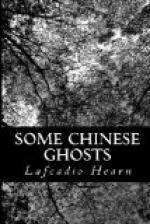“Sir, my mistress understands you wish to thank her for the trifling service she recently bade me do you, and requests that you will enter the house, as she knows you already by repute, and desires to have the pleasure of bidding you good-day.”
Ming-Y entered bashfully, his feet making no sound upon a matting elastically soft as forest moss, and found himself in a reception-chamber vast, cool, and fragrant with scent of blossoms freshly gathered. A delicious quiet pervaded the mansion; shadows of flying birds passed over the bands of light that fell through the half-blinds of bamboo; great butterflies, with pinions of fiery color, found their way in, to hover a moment about the painted vases, and pass out again into the mysterious woods. And noiselessly as they, the young mistress of the mansion entered by another door, and kindly greeted the boy, who lifted his hands to his breast and bowed low in salutation. She was taller than he had deemed her, and supplely-slender as a beauteous lily; her black hair was interwoven with the creamy blossoms of the chu-sha-kih; her robes of pale silk took shifting tints when she moved, as vapors change hue with the changing of the light.
“If I be not mistaken,” she said, when both had seated themselves after having exchanged the customary formalities of politeness, “my honored visitor is none other than Tien-chou, surnamed Ming-Y, educator of the children of my respected relative, the High Commissioner Tchang. As the family of Lord Tchang is my family also, I cannot but consider the teacher of his children as one of my own kin.”
“Lady,” replied Ming-Y, not a little astonished, “may I dare to inquire the name of your honored family, and to ask the relation which you hold to my noble patron?”
“The name of my poor family,” responded the comely lady, “is Ping,—an ancient family of the city of Tching-tou. I am the daughter of a certain Sie of Moun-hao; Sie is my name, likewise; and I was married to a young man of the Ping family, whose name was Khang. By this marriage I became related to your excellent patron; but my husband died soon after our wedding, and I have chosen this solitary place to reside in during the period of my widowhood.”
There was a drowsy music in her voice, as of the melody of brooks, the murmurings of spring; and such a strange grace in the manner of her speech as Ming-Y had never heard before. Yet, on learning that she was a widow, the youth would not have presumed to remain long in her presence without a formal invitation; and after having sipped the cup of rich tea presented to him, he arose to depart. Sie would not suffer him to go so quickly.
“Nay, friend,” she said; “stay yet a little while in my house, I pray you; for, should your honored patron ever learn that you had been here, and that I had not treated you as a respected guest, and regaled you even as I would him, I know that he would be greatly angered. Remain at least to supper.”




